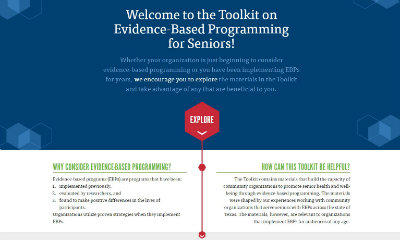 For more than a decade, support for evidence-based programs that improve care for older adults has grown consistently—though perhaps not as quickly as many advocates would like.
For more than a decade, support for evidence-based programs that improve care for older adults has grown consistently—though perhaps not as quickly as many advocates would like.
The reason is that evidence-based interventions—backed by research that demonstrates their effectiveness—are the gold standard for care. Studies have shown that older adults who participate in evidence-based programs have a lower risk—or improved outcome—of chronic diseases and falls.
The John A. Hartford Foundation has been committed to developing and disseminating evidence-based programs that improve care for older adults since 2001. That was the year the Board of Trustees approved a $1.3 million grant to the National Council on Aging (NCOA), giving birth to several specific evidence-based programs that have lasted: Healthy Ideas, Healthy Moves, and Healthy Eating.
For more on the growth of the evidence-based movement, read Chris Langston’s post: Grant Will Help Evidence-Based Movement Take Next Steps.
Over the years, the John A. Hartford Foundation has supported other successful evidence-based programs, including the IMPACT/Collaborative Care model of depression treatment shown to improve outcomes in primary care settings, and the Care Transitions Intervention, which has been shown to decrease unnecessary hospital readmissions by engaging community partners to coach older patients following discharge.
So we are happy to share a valuable new resource developed by the Community Research Center for Senior Health, a multi-disciplinary research center with an aim to develop and implement evidence-based programs to help improve the health of older adults. The Center—a partnership of Baylor Scott & White Health, the Texas A&M Health Science Center School of Public Health, and the Central Texas Area Agency on Aging/Aging and Disability Resource Center—has created a Web-based Toolkit containing materials, instructions, etc. for community-based organizations interested in evidence-based health interventions.
The Center came up with the Toolkit material through working with different organizations that serve older adults using evidence-based programs, which it defines as programs that have been “implemented previously, evaluated by researchers, and found to make positive differences in the lives of participants.” The Toolkit, which is offered on the evidencetoprograms.com website, does not advertise specific evidence-based programs. Rather, it serves as a guide to encourage organizations to research and implement evidence-based interventions.
 Dr. Alan B. Stevens
Dr. Alan B. Stevens“The website is designed for community-based organizations who are interested/mission driven to provide health interventions for seniors,” says Alan B. Stevens, PhD, the Centennial Chair in Gerontology at Baylor Scott & White Health, professor at the Texas A&M University Health Science Center, and co-chair of the John A. Hartford Foundation Change AGEnts Dementia Caregiving Network.
“This tool can be used by seasoned professionals and those less familiar with the topic alike,” Dr. Stevens says. “Users can explore paths for learning how to select an evidence-based program as well as how to implement a selected program. This is also a valuable educational tool for universities.”
The evidencetoprograms.com website explains the importance of evidence-based interventions, provides additional resources and a direction for evaluation planning, and describes how to implement and market these programs. The Toolkit features narrative texts, diagrams and tables to guide community-based organizations at each step of selecting, implementing, and evaluating evidence-based programs. There are two parts to the Toolkit: one about choosing the right program and another about implementing it.
Also included in the Toolkit are interactive flow charts to guide organizations through the entire process, and additional plans to ensure the program will be sustainable through changes in funding and resources.
For more information, read the article co-authored by Dr. Stevens on Frontiers in Public Health.
This is the 14th in an occasional series. See other Health AGEnda posts on Tools You Can Use:
Tools You Can Use: An Online Educational Series Focusing on Dementia in Older Adults
Tools You Can Use: The Quality Care Through a Quality Workforce Toolkit
Tools You Can Use: Webinar Series Covers Geriatrics-Competent Care for Medicare-Medicaid Population
Tools You Can Use: The Essentials of Cardiovascular Care in Older Adults
Tools You Can Use: Geriatric Transitions Objective Structured Video Examination
Tools You Can Use: A New APProach to Treating Older Patients
Tools You Can Use: Detecting Cognitive Impairment During the Medicare Annual Wellness Visit
Tools You Can Use: Preparing a Personal Advance Care Plan
Tools You Can Use: Guidelines for Assessing Patients Facing Surgery
Tools You Can Use: Principles for Treating Patients with Multiple Chronic Conditions
